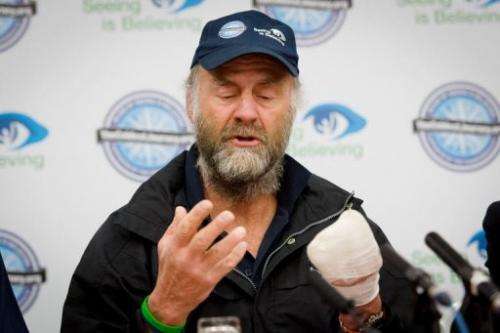Frostbitten British explorer Fiennes returns home

British explorer Ranulph Fiennes showed off a heavily bandaged hand as he returned home Monday following his evacuation from Antarctica with severe frostbite, and vowed to help the team he left out there.
The 68-year-old said it was "extremely frustrating" to be pulled off the trip, which if successful would have seen him become among the first people to ski across the world's coldest continent in winter.
He insisted the remaining five members of his team would succeed in their quest to be the first men to conquer Antarctica in winter, and said he would focus on helping them raise their target of $10 million (7.7 million euros) for charity.
"I'm not good at crying over spilt milk or split fingers," Fiennes told journalists at London's Heathrow Airport after flying in from South Africa, where he received several days of treatment on his frostbitten left hand.
"I started work on this expedition five years ago. I've been working on it, and nothing else, full time and unpaid—so it is definitely frustrating, but unavoidable," he said.
"I will make the best of it by putting my focus full time onto the expedition team—which of course is going on."
The team are making the epic trek in a vehicle dubbed the Ice Train, made from two snow tractors dragging carriages for scientific research, storage and accommodation.
They are set to start the winter crossing on March 20. The six-month journey via the South Pole will be mostly in darkness.
"Everything is going totally on schedule," said Fiennes.
The veteran explorer said he would throw his energy into helping the expedition reach its fund-raising target of $10 million for the blindness charity Seeing Is Believing.
As for his long-term future, he insisted this would not be his final expedition.
He would like to raise $20 million for charity before he retires, he told journalists.
"I would like to do something else to bring that figure up—and it won't be a jumble sale," he joked.
But Fiennes told AFP in an interview that he will probably not attempt to ski across Antarctica again.
"I probably won't because it takes a long time to set up," he said, adding that he would be unlikely to get fresh permission for the challenge because he could "die and become embarrassing to the British government".
The explorer, who is taking strong painkillers for his injuries, said the pain of frostbite "has to be experienced to be believed".
He famously sawed off the fingertips of the same hand himself after suffering severe frostbite on an expedition more than a decade ago.
"I had every reason to suspect that the damage from 13 years ago had completely gone," he told AFP.
He explained he had had no problems with the hand on recent expeditions, so the new bout of frostbite "was very bad luck indeed".
A vascular surgeon in South Africa examined the hand on Monday and believed he would only need surgery on two of the frostbitten fingers, Fiennes added.
The expedition has been dubbed "The Coldest Journey", with Antarctica having the planet's lowest recorded temperature of minus 89.2 degrees Celsius (minus 128.6 degrees Fahrenheit).
Previous expeditions have managed to achieve just 60 miles (37 kilometres) of the more than 2,000-mile journey in winter.
(c) 2013 AFP



















